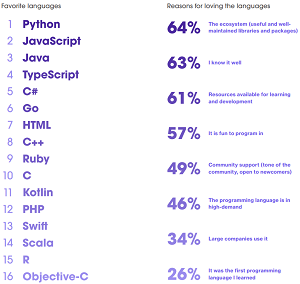News
Microsoft Claims 2 of Top 5 Favorite Programming Languages in New Report
Careers firm Hired published a "2022 State of Software Engineers" report that analyzes demand, salaries, skills and preferences, including programming languages.
In that latter space, Visual Studio Magazine readers will be interested to learn that two of Microsoft's own languages, TypeScript and C#, claimed two of the top five answers to a "favorite languages" question, coming in at No. 4 and No. 5 after the usual cast of characters: Python, JavaScript and Java.
 [Click on image for larger view.] Software Engineers' Favorite & Least Favorite Languages (source: Hired).
[Click on image for larger view.] Software Engineers' Favorite & Least Favorite Languages (source: Hired).
Factors that make a language favorable to software engineers include:
- Their useful and well-maintained libraries and packages
- Engineers typically know them well, which makes them more fun to program in
On the negative side, respondents said their least favorite languages:
- Are not fun to program in
- Are complex and overwhelming
- Provided a bad experience for many working with them
Throughout the report's take on programming languages, TypeScript outperformed its cousin, C#.
For examples, it was:
- No. 7 among the hottest software engineering skills, when measured by demand by coding skill vs. marketplace average (C# didn't rank)
- No. 7 among top skills for individual contributors (C# didn't rank)
- No. 4 among top security engineer skills, No. 8 among top backend engineer skills and No. 4 among top blockchain engineer skills (C# didn't rank in any)
- Among the top 10 in top skills for data, embedded, frontend, gaming, ML and mobile (C# didn't rank in any)
- No. 6 among top SMB skills, No. 7 among top mid-market skills (C# was No. 10) and No. 8 among enterprise skills (C# was No. 9)
"The top in-demand skills remain similar across different company sizes," Hired said. 'However, engineers will be more likely to use C# and C++ at mid-sized and larger firms compared to smaller companies and startups."
Other than the above, there wasn't much in the report specific to Microsoft-centric development with Visual Studio and Visual Studio Code. For example, Microsoft's flagship IDE and open-source-based code editor weren't even mentioned, nor was .NET.
General highlights of the report as presented by Hired include:
- Security engineers saw the highest salaries: Security engineers experienced the highest salary growth compared to 2020 and received the highest average salary ($165,505/year) out of all software engineering roles.
- Full stack engineers saw the highest demand: Engineers with full stack expertise received the highest increase in interview requests compared to other software engineering roles on Hired's platform.
- Remote software engineering salaries increased globally: Remote salaries increased across all markets in 2021. The most notable increases were for candidates in markets such as Toronto, Los Angeles, Austin and Denver, which saw salary increases for average remote salaries between 7-14 percent year-over-year (YOY).
- Companies are hiring more remote software engineers from smaller markets: Software engineers who are open to remote work received 20 percent more interview requests overall versus candidates who are not. While the San Francisco Bay Area continues to offer the highest salaries on average across all regions at $168,000/year, smaller markets, including Austin, Seattle and Chicago, have seen higher salary growth last year versus the traditional tech hubs -- reinforcing the shift towards hiring remote talent in smaller regions.
- Software engineers continue to embrace non-traditional education and upskilling: The number of software engineers who acquire their skills through non-traditional avenues, such as bootcamps and self-directed learning, have steadily increased over the last two years. While 46 percent of software engineers have a computer science degree, 24 percent are self-taught, and another 11 percent learned how to code through a bootcamp program.
- Software engineers are most motivated in their careers by opportunities for new challenges and continuous learning; building products and problem-solving; and earning potential: The top three pressing issues that engineers are most excited to tackle with their coding skills are public health, access to education and the future of work in the upcoming years.
- Companies must prioritize company culture and flexibility to recruit top software engineering talent: When surveyed on the most critical elements of an ideal work environment, software engineers ranked "great managers," "flexibility around work hours" and "coworkers they get along with and can learn from" as most important, respectively.
"The demand for software engineers is simply not slowing down," Hired said. "We've run out of ways to describe how much it's increasing. Digital transformation may sound like a buzzword, but as more of the planet arrives online, as business owners become more creative and explore new distribution channels -- as our lives evolve, we need software engineers."
The report is based on internal data and a survey of more than 2,000 engineers.
About the Author
David Ramel is an editor and writer at Converge 360.